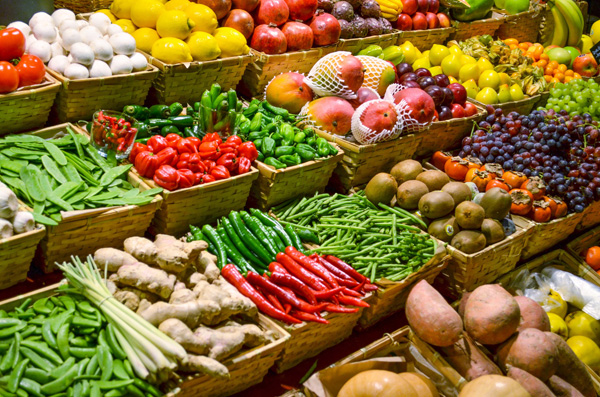
One of the questions my friends back home always ask me about living in China is ‘How do you survive being a vegetarian in China? What do you eat?’. I would say it’s really not a matter of survival, China has an abundance of great food, its more a matter of knowing where to look for tasty veggie food and deciding on your own boundaries as a vegetarian.
Here are just a few ways I’ve found that have helped me as a vegetarian living in meat-loving China:
1 – Tofu is abundant
If there is one thing China gets right in terms of food, it’s tofu. Tofu is a food mainly made from soy, though it has several variations. It is used in both sweet and savory dishes, and can be a great source of protein. Tofu in China is prepared in all sorts of different and tasty ways including the spicy Sichuan dish má pó dòufu 麻婆豆腐 [麻婆豆腐], or using plain tofu in salads or wraps, and if you’re feeling brave there’s chòu dòufu 臭豆腐 [臭豆腐] (literally meaning ‘smelly tofu’).
2 – Cooking at home
Finding a wide variety of vegetables is super easy in China, with fruit and vegetable shops on every other corner you can pick up all your staple vegetables, as well as some more exotic ones such as: pak choi (Chinese cabbage), jiè lán 芥蓝 [芥藍] (Chinese broccoli), máodòu 毛豆 [毛豆], lotus ǒu 藕 [藕] and many more. Pick up some eggs and spicy sauce to go with your steamed veggie combination and there’s an easy and tasty feast.
3 – Learn the essential Chinese vocab when eating out
Of course there will be many occasions when you want to eat out and sample the wide variety of food that China offers; don’t let being a veggie put you off going to the restaurants of your choice. Chinese kitchens are fairly accommodating, just let them know what you want. Here is some key vocabulary you can use to ensure you avoid meat:
I don’t eat meat — wǒ bù chī ròu — 我不吃肉 [我不吃肉]
I don’t eat fish — wǒ bù chī yú — 我不吃鱼 [我不吃魚]
I only eat vegetables — wǒ zhī chī shūcài — 我只吃蔬菜 [我隻吃蔬菜]
I’m a vegetarian — wǒ chīsù — 我吃素 [我吃素] / wǒ shì sùshí zhě — 我是素食者 [我是素食者]
I don’t eat pork/beef/fish/lamb — wǒ bù chī zhūròu/niúròu/yú/yángròu — 我不吃猪肉/牛肉/鱼/羊肉 [我不吃豬肉/牛肉/魚/羊肉]
Please add more vegetables to this dish — qǐng duōjiā shūcài — 请多加蔬菜 [請多加蔬菜]
Does this have meat in it? — zhè cài yǒu fàng ròu ma? — 这菜有放肉吗? [這菜有放肉嗎?]
Please can I have this without meat, I’m a vegetarian. — qǐng bùyào fàng ròu, wǒ chīsù — 请不要放肉,我吃素 [請不要放肉,我吃素]
Is this cooked with meat? — tiáoliào lǐ yǒu fàng ròu ma? — 调料里有放肉吗?[ 調料裡有放肉嗎?]
Do you have vegetarian food? — nǐ yǒu méiyǒu sùshí? — 你有没有素食? [你有沒有素食?]
4 – Be flexible
If, like me, you find it pretty exhausting checking and rechecking if your dish has meat somewhere in it, then I suggest being more flexible as a vegetarian whilst living in China is an easier option. Vegetarianism is not a common thing here, and though there are a few places that specifically cater to it; it is far from the norm. Therefore, especially when sharing meals with my Chinese friends, I have adopted a more relaxed attitude to my vegetarianism. For example, I worry less about if it has been cooked with meat and simply stick to the vegetable dishes. Or if there is a dish where the vegetables and meat have been placed together, then I will pick the vegetables off the plate and eat those. As mentioned previously it is often about finding your own boundaries as a vegetarian, and this is simply my method, you can adapt and find your own way of sharing meals with friends whilst in China. I’ve found my Chinese friends are more than willing to accommodate my vegetarianism and will specifically order more vegetable dishes for me.
5 – Vegetarian restaurants
Vegetarian restaurants also exist in Shanghai and other big cities, which are there to specifically cater to the veggie society that, although is currently quite small, is growing everyday, especially as more foreigners enter the city. In Shanghai, for example, for some of the best recommendations you can consult many lifestyle websites, or food apps such as Bonapp. For now, here are a few to get you started: Pure and Whole, Vegetarian Lifestyle and Organic Kitchen. In addition to these restaurants more and more restaurants throughout the city already have vegetarian options built into their regular menu.
The variety of food for vegetarians is ever-growing in China, and though initially it’s tough to know where to eat and how to avoid meat, it can be done and often with very tasty results.
— Nadine Golding
Check out more of TCB’s food blogs here.























